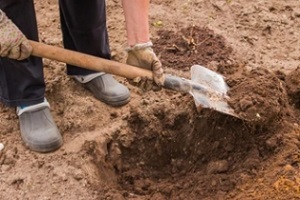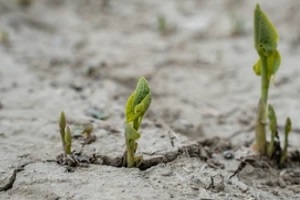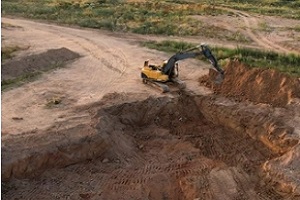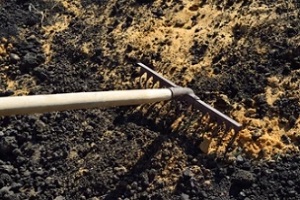 At the heart of every successful gardening project is good soil. However, it is not enough to plant a garden in high-quality soil – it must also possess the right conditions to allow plants to thrive.
At the heart of every successful gardening project is good soil. However, it is not enough to plant a garden in high-quality soil – it must also possess the right conditions to allow plants to thrive.
One common problem found in home gardens is soil compaction. In compacted soil, a lack of airspace between the pores means water and nutrients will struggle to circulate, leaving the plant’s roots with nowhere to grow.
Outlined below are 5 negative effects of soil compaction, along with some useful tips for correcting the problems that arise:
1. It Inhibits Root Growth
When soil is compacted, it can restrict the growth of a plant’s roots. Because compaction reduces the number and size of the large pores within soil known as macropores, roots will struggle to find pores big enough to allow them to grow.
Their inability to grow into deeper layers of soil can cause them to spread horizontally instead. A plant with shallow roots can dehydrate more easily and may be unable to withstand higher winds. It may even uproot due to the weight of its own canopy. Moreover, poorly rooted plants do not usually grow as big as those with better roots.
2. It Prevents Plants From Accessing Vital Nutrients
Soil that is overly compacted tends to be very low in essential plant nutrients such as nitrogen and manganese due to the lack of air in the soil. Moreover, plants use cellular respiration to absorb potassium. When there is no oxygen in the soil because of compaction, the root membrane will be unable to absorb this essential nutrient.
3. It Stops Plants From Getting Water And Oxygen
 Water often struggles to move downward in compacted soil, which means it will only saturate the upper layers of the garden and not reach the roots. In addition, because compacted soil has fewer and smaller pores between its particles, air will be unable to reach the roots. This also means that the beneficial organisms within the soil that depend on oxygen to survive will die, leaving the plants vulnerable to a number of diseases.
Water often struggles to move downward in compacted soil, which means it will only saturate the upper layers of the garden and not reach the roots. In addition, because compacted soil has fewer and smaller pores between its particles, air will be unable to reach the roots. This also means that the beneficial organisms within the soil that depend on oxygen to survive will die, leaving the plants vulnerable to a number of diseases.
4. Seedlings May Struggle To Germinate
Seeds need sufficient contact with soil in order to stay hydrated and germinate. When soil suffers from surface compaction that causes a thick crust, seedlings may not be able to push through the tough layer and could die before ever emerging.
5. It Promotes Water Run-Off
Compacted soils often have a crusted surface that promotes water run-off. As a result, the roots of plants growing in these soils may not get enough water despite getting sufficient surface irrigation. They may suffer from the effects of drought, demonstrating signs such as discolored leaves and wilting due to their inability to move nutrients around their systems.
How To Fix Soil Compaction
There are many reasons that soil compaction is undesirable in a garden. Thankfully, there are several ways that compacted soil can be modified to give plants the best chance at thriving. Here is a look at 5 ways of correcting compacted soil.
Aerating The Soil
Introducing air into compacted soil can make it more suitable for planting. When a small area is affected, a metal garden fork can be used to poke holes in the soil that will allow water and air to make its way inside and enable roots to take hold. Simply push the fork into the ground every few inches, working in one direction; repeat the process using a different direction to maximize aeration.
Another option is to use a rototiller equipped with an aeration attachment. This can be run across the affected area several times to help loosen the compacted soil, although it is important to avoid tilling too often as this may cause a hardpan of soil to develop beneath the tilled area.
Replacing The Soil
 When the amount of compacted soil that needs to be corrected is relatively small, removing all of the soil and replacing it with better soil is often the best solution. Aerated topsoil should be spread a few inches thick across the area to be planted.
When the amount of compacted soil that needs to be corrected is relatively small, removing all of the soil and replacing it with better soil is often the best solution. Aerated topsoil should be spread a few inches thick across the area to be planted.
However, if the goal is to plant shrubs or trees, a far deeper level of new soil will be needed to support root growth. When using this approach, it is important to choose a type of replacement soil that is capable of sustaining plant growth.
Burying The Compacted Soil
In cases where removing soil and replacing it is not feasible, the compacted soil can be buried under a better type of soil. Although it will still be necessary to bring soil to the site, there is no need to remove the old soil. This approach can be used uniformly across a large space or just in certain areas where bigger plants are going to be planted.
Amending The Soil With Organic Material
Amending soil with organic material is a longstanding agricultural practice that can help reduce a soil’s density to below root-limiting levels. These amendments should be tilled or dug into a depth of around 18 inches. Some of the best options include peat humus, peat moss and composted food waste. Anything that has soluble salts and a pH that is compatible with the plants that are being grown is acceptable, although sustainable sources of compost are more practical in the long run.
Amending The Soil With Inorganic Material
Studies have shown that poor soil can be amended with inorganic material to increase its density and draining properties. Inorganic amendments such as sand can be used at a ratio of approximately 70 percent by volume. For this approach to be successful, the amendment needs to be as uniform as possible and medium to large in grain size. Amendments with nearly equally sized particles are ideal.
 However, although this may work in theory, it can be very difficult to achieve in practice as it is not easy to add enough inorganic amendment to a soil to bring about meaningful improvements. A significant amount of amendment would need to be added and tilled, which would require just as much work as using one of the more natural approaches.
However, although this may work in theory, it can be very difficult to achieve in practice as it is not easy to add enough inorganic amendment to a soil to bring about meaningful improvements. A significant amount of amendment would need to be added and tilled, which would require just as much work as using one of the more natural approaches.
Discuss Your Project With The Soil Experts At Dirt Connections
No matter what type of soil you are working with, the friendly team at Dirt Connections can help you achieve your project’s goals. We deliver fill dirt and other types of soil to residential and commercial sites throughout Northern Virginia. Contact us today to discuss your project and schedule a dirt delivery.
Summary

Dirt Connections was started with one goal in mind: providing quality residential and commercial construction services to clients on time and on budget. Reach out for more information on how we can support your next project.
For your convenience our estimates are free and by appointment. Call 703-940-9949 for a free estimate today!










































